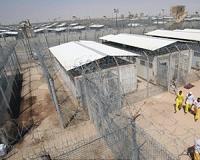| . |  |
. |
Damascus (AFP) July 17, 2010 Self-exiled Iraqi radical Shiite cleric Moqtada al-Sadr visited Damascus on Saturday from his base in Iran for talks with Syrian President Bashar al-Assad on Iraqi affairs. During the meeting, Assad urged Iraqi leaders to quickly form a government and put an end to a four-month coalition stalemate, the official SANA news agency reported. "Any delay to form a (national unity) government will have a negative impact on the situation in Iraq," Assad was quoted as telling his guest, stressing that a new cabinet should be set up "as soon as possible." Iraqi politicians have failed to form a new government since former premier Iyad Allawi's narrow victory over incumbent Prime Minister Nuri al-Maliki in the March 7 parliamentary polls. The bloc of anti-US cleric Sadr, who is rarely seen in public and who lives in self-imposed exile in Iran, gained 39 seats in the new 325-strong parliament, against 91 for Allawi and 89 for Maliki -- both Shiite Muslims. Initially Sadr was opposed to the return of Maliki as prime minister but in May he said he removed his objection under certain conditions. SANA quoted Sadr as praising Syria for its support of the Iraqi people and "for working in favour of security and stability in Iraq." Hazem al-Araji, a Sadr bloc MP, told AFP in Baghdad that the cleric travelled to Damascus "at the official invitation of Syrian President Bashar al-Assad to discuss Iraqi affairs." Sadr's visit to Syria -- his second since July last year -- comes after Iraqi legislators on Monday extended an inaugural parliamentary session by two weeks to give political leaders a chance to form a government.
earlier related report Citizens of Australia, Britain, Canada and several Asian and South American countries were among those killed in Thursday night's blaze in Sulaimaniyah, which raged for seven hours before being brought under control, officials said. A preliminary report prepared by the city's hospital said people from 12 nations had died and a medical official said the bodies of the foreigners were identified by colleagues from the respective companies they worked for. Visiting telecommunications engineers from Sri Lanka, the Philippines and Cambodia, were among the victims, according to hospital officials and the chairman of the telecoms company. "The number killed is 30, among whom there are 14 foreigners," said Rikot Hama Rasheed, the director of Sulaimaniyah hospital, following the fire, which rose rapidly from the second floor of the six-level Soma hotel. "The regional government will contact the embassies of the foreigners who were killed," said Rasheed, listing Iraq, Ecuador, Venezuela, Lebanon, South Africa and Bangladesh as among the victims' nationalities. He said 22 survivors were receiving treatment at the hospital. Witnesses told AFP at least three of those who died did so after leaping from the hotel's windows in a desperate bid to save themselves as flames and smoke engulfed their rooms. Mirwan Saeed, 30, who was visiting friends in the hotel, broke both his legs after making his way to the roof and jumping towards a nearby lower building to save his life. "We were in the hotel when the smoke started coming in," he told AFP from his hospital bed. "I had no choice but to jump." Colonel Araz Bakr, chief of Sulaimaniyah rescue services, confirmed the death toll and said 42 people were injured, including seven firefighters. He said most of those who died were suffocated by smoke. A city council official said an electrical fault caused the blaze, which also damaged several adjacent buildings. "Women and children are among the victims of the incident which happened in the Soma Hotel," said the official, Razgar Ahmed. Sulaimaniyah, 270 kilometres (170 miles) north of Baghdad is the capital of one of three northern provinces that make up Iraq's autonomous Kurdish region. It is popular with tourists and business has flourished in recent years as it is peaceful, unlike much of Iraq which remains wracked by violence seven years after a US-led invasion toppled now executed dictator Saddam Hussein. The victims from the Philippines, Sri Lanka and Cambodia worked for telecoms operator Asiacell, one of three major mobile communications companies in Iraq. "We lost four engineers from our company, one of them a lady from the Philippines, and three of them men from Sri Lanka, Cambodia and Iraq," said Faruk Mula Mustafa, chairman of Asiacell. Two other Iraqi employees were injured in the fire, he said. A US embassy spokesman in Baghdad said two American citizens received medical treatment after the fire, but none were killed.
Share This Article With Planet Earth
Related Links Iraq: The first technology war of the 21st century
 US army hands over last prison in Iraq
US army hands over last prison in IraqBaghdad (AFP) July 15, 2010 The US army handed control of Camp Cropper prison to Iraqi authorities on Thursday, effectively ending one of the most controversial chapters of the seven-year-long American military occupation. Cropper, west of Baghdad and now holding 1,600 detainees, opened immediately after the US-led invasion in March 2003 and was built to handle senior members of Saddam Hussein's toppled Baathist regime ... read more |
|
| The content herein, unless otherwise known to be public domain, are Copyright 1995-2010 - SpaceDaily. AFP and UPI Wire Stories are copyright Agence France-Presse and United Press International. ESA Portal Reports are copyright European Space Agency. All NASA sourced material is public domain. Additional copyrights may apply in whole or part to other bona fide parties. Advertising does not imply endorsement,agreement or approval of any opinions, statements or information provided by SpaceDaily on any Web page published or hosted by SpaceDaily. Privacy Statement |